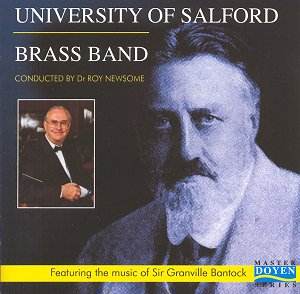I owe it to Lewis Foreman that I know about this disc
at all. It represents one part of the modestly rising tide of Bantock's
music now accessible to the listening public.
Classical listeners may be tempted to look down their
noses at the brass band world. I hope that anyone tempted to do so might
be dissuaded by this and by many other Doyen releases. The world is
a lot fuller of Bantock CDs than it ever used to be but one can hardly
claim that it is a crowded market. This one fleshes things out rather
well. The inspirations of these pieces also provides a neat summation
of Bantock's range of literary kindling. The oriental side is catered
for by Kubla Khan (other related works include Omar Khayyam,
The Song of Songs, a dozen or more volumes of Chinese songs and
the masterly Four Chinese Pictures). The Gaelic-Caledonian side
is reflected in The Land-of-the-Ever-Young in the same world
as the Hebridean and Celtic symphonies and many partsongs.
Mediterranean mythology: Prometheus, Cyprian Goddess,
The Frogs and Orion. The Shakespearian ‘line’ takes in
works such as Macbeth as well as the current King Lear.
Kubla Khan: Mixing Tchaikovskianisms
(4.08) with Slav atmosphere this piece is replete with echoes of Bantock’s
masterwork: the choral/orchestral triptych Omar Khayyam. There
is an Oriental dance at 4.58 which sounds somewhat like Holst's Beni
Mora. This work is an orchestration of the six-part choral song
of the same name from 1912. The original was written at his inventive
perigee.
Prometheus Unbound is shot through with
morbid and tragic feelings which relate to the writing to Mussorgsky.
When the clouds break and sunlit singing intervenes there remains a
distinctly Russian feeling as at 2.23. Such an alignment is typical
of one of Frederick Corder's pupil's at the Royal Academy of Music.
The R.A.M. pupils such as Bantock, Holbrooke, Bax, Benjamin Dale and
Paul Corder favoured Tchaikovsky over Brahms, Wagner over Beethoven,
Sibelius and Balakirev over Bruckner.
The Land-of-the-Ever-Young (Tir-nan-Og)
was one of the paradises of the ancient Celtic peoples alongside Hy-Brasil
and Moy Mell. Bantock busied himself with such worlds though
probed nowhere near as deeply as Arnold Bax whose sincere spirituality
and fantasy can be heard in the triptych of the last three symphonies
(especially the great Sixth) as well as in Fand, Tintagel
and The Faery Hills. This was his last brass band work written
in the year of his death. It is more of a gentle fantasy by a master
of brass writing than a visionary-mystic 'ave atque vale'.
As mentioned above, the Greek mythological world drew
Bantock's ever-questing attention. The Frogs was but one
of the Aristophanes plays for which he wrote 'comedy overtures'. The
others from the early 1940s included The Birds and Women's
Festival and all were recorded in their original orchestral ‘cloth’
on Paxton 78s. The Wasps seems to have been left alone for Vaughan
Williams. This, as with the other two by Bantock, is a comedy overture
being written for orchestra in 1935. It was scored for brass band by
Frank Wright in 1952 six years after Bantock's death. It is a an athletic
and relatively uncomplicated Tchaikovskian fantasy with much silvery
work and very finely contrived orchestration. Wright's arrangement has
kept the work alive.
Orion is termed a ‘tragic overture’
and certainly it has a bitter grimace and a restlessness quite absent
from King Lear. Lear by comparison hardly
ruffles the emotions giving us some relaxed Tchaikovskian gestures (3.49)
closer to the Fifth Symphony than the roller-coaster of the Fourth.
Orion: After a Tchaikovskian fate motif spat out defiantly
there is some gloomy writing worthy of Balakirev's Thamar. Silvery
soprano brass playing contrasts with gruff Sibelian rumblings, rebuffs
and assaults. This work has the serious mien and terse originality of
the Sophoclean orchestral Overture to a Greek Tragedy (once
brilliantly recorded on a Lyrita SRCS LP).
Bantock, rather like Holbrooke, had to be something
of a journeyman. If commissions came they were to be valued. The Festival
March was written for the Independent Labour Party movement
and is his first brass band work. The march bustles along sunnily, animated
and smiling, not desperately profound but certainly celebratory. Dvořák
and Smetana are the reference points.
This disc comes from a company with a firm brass band
heritage. This probably accounts for a number of presentational matters.
The conductor is referred to as Dr Roy Newsome. His academic qualifications
are quoted on the back of the CD and in the insert. Allowing for ‘Sir’
this or ‘Sir’ that, when did we last see a classical CD making something
of the style 'Dr' or quoting academic qualifications for a conductor?
The other minor observation relates to the prominence given to the name
of the band over the name of the composer. This is not the natural way
with the classical recording world. The emphasis is reversed for the
back of the booklet and the rear insert of the CD case. A very minor
cavil.
I do hope that Doyen will venture forth into classical
waters again. It would be good to hear them in a second Bantock brass
collection. Also of great interest would be a recording of Arthur Butterworth's
brass symphony - Odin. Other projects I would ask them to consider
include the brass band marches of Prokofiev, the brass band works of
Maurice Johnstone and the hyper-romantic Rhapsody for piano and brass
by Gordon Jacob. The Jacob is a whirlwind of a piano concerto set in
a heroic romantic mode: glorious but unrecorded.
The background and details for each work are extremely
well put across in Roy Newsome's notes. This is a delightful disc which
is warmly recommended to fans of the heritage of the British musical
renaissance and to Bantock's worldwide following,
Rob Barnett
se also review
by Chris Thomas
